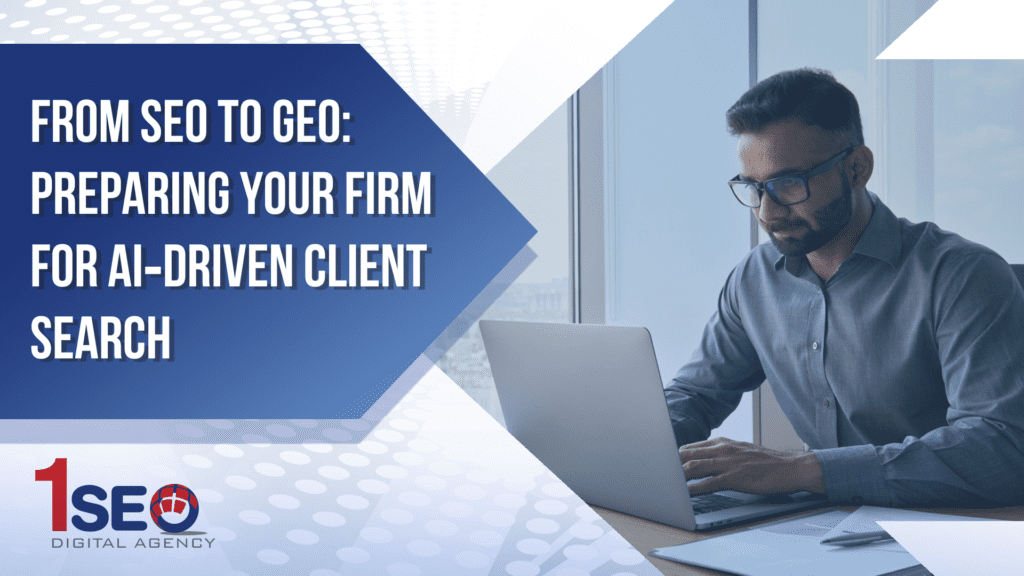Speak To An Expert Now: 215-946-1046
In The Beginning…There Was Creativity!
Being creative and being a Legal Services provider seem to go hand-in-hand. In history, the earliest organized societies recognized that there was a need for

With over a decade of hands-on experience developing ethical, ROI-focused marketing strategies for law firms, consultants, and professional service organizations, 1SEO Digital Agency brings deep expertise in navigating the evolving landscape of digital client acquisition. From bar association compliance to geotargeted ad campaigns, our team delivers results-driven solutions tailored for industries where trust, precision, and professionalism are paramount.

In 2025, professional services firms—including attorneys, accountants, consultants, and tech companies—must embrace a future where SEO is no longer enough. Instead, the landscape has shifted toward GEO: geotargeted, AI‑driven client search. As search engine optimization evolves into personalized search based on location, language, behavior, device, IP address, and audience segmentation, law firms marketing personal injury or estate planning practice areas must be proactive. This transformation impacts search engine results page dynamics, brand awareness, lead generation, return on investment, and marketing strategy. For firms offering legal advice in divorce, immigration, intellectual property, or environmental law, integrating GEO with traditional SEO and PPC ads—including Google Ads, Facebook Ads Manager, Meta Ads, and social media ads—can dramatically boost visibility, credibility, and revenue.
Search engine optimization has long been the bedrock of digital marketing for lawyers, attorneys, business lawyers, and legal firms. SEO strategies revolve around keyword research, creating authoritative content, acquiring a backlink profile, optimizing landing pages, improving site speed, and building brand signals. In personal injury law, for example, firms rely on content marketing—blogs, infographics, ebooks, newsletter campaigns—to rank for keywords like “accident lawyer,” “personal injury,” and “legal advice.” Traditional search engine optimization is built on the assumption that potential clients use Google search to find legal services. But user behavior is changing. Consumers now expect more personalized, local, and intuitive results—creating the need for geo‑aware strategies that blend digital advertising, audience segmentation, and local presence.
GEO, or geographic targeting, goes beyond zip code location targeting. In 2025, AI‑driven search platforms incorporate geotargeted marketing, behavioral signals, device type, IP address resolution, and real‑time context. For law firms, this means search visibility depends on more than SEO and ranking; instead your marketing strategy must cater to local search, audience segmentation, lookalike audience modeling, and geotargeted advertising. Imagine someone searching for an estate planning attorney in New York City via a mobile app—AI personalizes results based on their proximity, device usage, previous interaction with your website, and even their demographic segment: gender or age group. This shift requires investment in analytics, digital marketing tools, Google Analytics, audience behavior tracking, and personalization—so you can deliver relevant content and message at the right moment, in the right place.
Law firms and consulting firms often allocate substantial budget to legal advertising through Google Ads, law firm PPC, and online advertising. But in 2025, ad spend must tie back to data‑driven return on investment. Firms must set goals: cost per lead, conversions on landing pages, quality of leads, and long‑term reputation enhancement. GEO allows finer geographic targeting, so your ad campaign doesn’t waste budget on irrelevant audiences far outside your jurisdiction. A divorce attorney, for example, needs to run ads to the ideal client within a specific county or zip code, using PPC ads, Facebook advertising, Meta ads, or legal services placements. With precise marketing automation, tracking, and google analytics, thresholds like cost per lead and cost per click can be optimized, improving lead quality and avoiding the risk of wasted ad spend.
Even the best lawyer or consultant benefits from local brand awareness and reputation management. GEO strategies help your firm appear consistently across local search and geotargeted ads, increasing familiarity and trust among prospective clients. When you have strong local reputation signals—client reviews, citations, your presence on local directories, alignment with bar association ethics and guidelines, American Bar Association content, even press mentions—you elevate your credibility. Expertise in personal injury law or intellectual property can be reinforced through local content: infographics, blog posts, podcasts, and webinars featuring your expert attorneys. This leads to brand recall when someone in your market searches for “accident lawyer near me” or “asset protection attorney.”
Begin with market segmentation. Identify your target audience—for a law firm, that might mean individuals seeking personal injury, divorce, employment, or immigration services in a given city or state. Leverage consumer behavior data, demographics (gender, age, income), and psychographics. Develop lookalike audience profiles based on existing clients or leads. This segmentation informs your copywriting, message, and advertising channels, so that your legal marketing speaks to pain points or motivations: fear of liability, justice, compensation, negotiation, or estate planning risks.
Use extensive keyword research to identify not only general legal search terms like “law firm marketing,” “personal injury,” “legal technology,” “legal services,” but also location-specific phrases: “accident law firm New York,” “employment lawyer Boston MA,” “IP lawyer Philadelphia.” Your content strategy must integrate these terms into blogs, landing pages, infographics, ebooks, and newsletters to build organic visibility. Even as SEO remains valuable, content must also feed into AI‑driven GEO models. An infographic that visually explains an accident claim process or estate planning checklist adds appeal and shareability. Ensure that every piece of content includes proper SEO optimization, meta tags, schema markup, structured data for local search, and internal links.
Ensure your website is fully optimized: fast load times, mobile app compatibility, secure hosting, clear structure, SSL encryption. Set up Google Analytics and other analytics tools for tracking; install pixel tracking for social media ads, Facebook advertising, and Meta ads. Manage negative keyword lists in PPC campaigns to avoid irrelevant traffic. Use audit tools regularly to assess backlink health, technical errors, page speed, and SEO compliance. Integration with CRM or Salesforce lets you capture email address, lead origin, costs, and impetus for conversion. This technical foundation allows the AI and GEO layers to operate effectively.
When creating law firm ads, use location targeting to refine exposure by radius, zip code, or even neighborhood. GEO ads work hand‑in‑hand with audience targeting: combining geotargeted marketing with lookalike audience segments, demographic filters, and behavioral markers. Ads should include clear call to action, highlighting expertise: “Divorce attorney in NYC,” “Personal injury lawyer Bristol PA,” or “Immigration legal advice for tech companies.” Use compelling headline and message that align with your value proposition, whether empathy, litigation success, or consultation efficiency. Ensure each landing page ties to the ad message and guides prospects toward contacting your firm.
AI in search and ads can serve different content versions to different segments. For example, someone searching from a mobile device in New York City might see a different landing page than someone on a desktop in Philadelphia. This personalization increases relevance, improves conversion, and raises the experience for potential clients. Content variations can address niche markets: intellectual property for startups, arbitration for corporations, or estate planning for affluent clients. Your messaging might mention the American Bar Association, rule of law considerations, or even case studies (without breaching confidentiality) that cement expert authority.
In a unified digital marketing strategy, SEO, PPC ads, and social media campaigns reinforce each other. A blog optimized for local personal injury keywords boosts organic visibility and fuels link-building for SEO. Simultaneously, PPC ads target immediate searches. Social media ads—especially Facebook and Meta ads—use pixel data to retarget visitors, nurture leads via content like newsletters or webinars, and lookalike audience modeling to find new prospects. Each channel informs your marketing automation and analytics data, helping you refine strategy in real-time and improve cost per lead metrics.
Professional services firms must navigate strict ethical rules when advertising. The American Bar Association, local bar associations, and jurisdiction rules govern lawyer advertising. This includes disclaimers, honesty in advertising campaign content, respect for privacy, avoidance of sensationalism, and correct use of testimonials. AI‑driven GEO targeting must respect privacy and data consent rules. Firms practicing immigration law, employment law, or environmental law should carefully monitor message alignment with bar policy. In AI‑enabled personalization, ensure that no prohibited demographic targeting is used.
Your brand reputation is critical. A negative review, complaint, or article can reduce visibility in both geo‑aware search engines and maps. Implement ongoing reputation management by soliciting reviews, responding professionally to feedback, maintaining ethical standards, and monitoring mentions. Infuse your content marketing with trust signals—mention of team credentials, case results (general), affiliations, awards, and published thought leadership. In the world of AI, signals like trust, authority, and user satisfaction increasingly determine ranking among geo‑personalized search results.
Track every conversion and lead source using Google Analytics, CRM integrations, and ad dashboards. Monitor metrics like cost per lead, lead generation, ad investment, return on investment, landing page conversion rate, and engagement. Percentage-wise improvements in visibility, traffic, and engagement offer insights for budgeting. Audience segmentation data—from gender splits, location, device, time of day—help refine GEO targeting. Analyze performance across law firm ads, SEO content, social media campaigns, and geotargeted ads simultaneously.
Effective marketing strategy in 2025 requires continuous research. Use analytics tools and AI behavior prediction to learn what copy, message, or infographic resonates with prospective clients in your geography. A/B test headlines, landing page designs, call‑to‑action buttons, and ad creative. Monitor competitor activity: do firms like Perkins Coie or others in your region run broader GEO campaigns? What keywords they target? Develop competitive advantage through unique value proposition messaging: your firm’s leadership, niche practice in intellectual property or arbitration, or specialization in corporate or personal injury defense. Use audit tools to look at competitor backlinks, content, and geographic reach.
Firms should designate internal or outsourced leadership responsible for GEO and SEO strategy. Team members need training in legal technology, analytics, audience targeting, geotargeted marketing, copywriting, content creation, and Google Analytics. They should build partnerships with vendors and agencies familiar with law firm marketing, Google Ads, social media ads, and geotargeted campaign execution. Subscribe to resources like the American Bar Association’s marketing ethics guidance and stay current with search engine policy changes.
As your firm grows or diversifies—adding business law, employment law, intellectual property, arbitration, or estate planning—you can replicate the GEO-enabled marketing model across jurisdictions. Each city or county has unique landscape, competition, and local SEO factors. Conduct localized keyword research, tailor your copywriting, craft landing pages for each niche, and customize ads for local segments. Monitor competition, consumer behavior, and cost patterns; compare cost per lead regionally. This enables expansion without sacrificing ROI or message clarity.

AI brings concerns: ethical targeting, consent, privacy around IP address tracking, mobile data, behavioral profiling, and ad personalization. Law firms must follow rules around sensitive data, demographic targeting restrictions, and avoid discriminatory practices. Stay updated on AI policy and ad platform rules, particularly regarding targeting by gender, age, or protected classes.
In 2025, legal marketing tools may include marketing automation platforms, predictive lead scoring, mobile apps, chatbots, and virtual assistants. GEO‑aware AI chatbots can route leads based on the user’s location, language preference, or legal issue. Podcasts featuring expert attorneys, ebooks, webinars, and infographics extend your content strategy. Integration with CRM systems like Salesforce ensures seamless client intake and efficiency. Firms that embrace these innovations gain a competitive advantage.
In 2025, AI and natural language search are revolutionizing how potential clients find professional services. Rather than typing a standard phrase like “immigration attorney NYC,” people now speak queries into their mobile app or digital assistant: “Who’s the best lawyer near me for estate planning who speaks Spanish?” AI uses language, context, behavior, and IP address to interpret intent and deliver hyper-relevant results. This shift means law firms, consultants, and tech companies must embrace keyword research that goes beyond traditional form. Instead, content must anticipate conversational queries and long-tail, spoken-style search phrases. Embedding FAQs that answer questions such as “What should I do after a car accident?” or “How much does a divorce lawyer cost?” can elevate landing pages, content marketing, and local SEO. Highly optimized paragraphs about personal injury law, intellectual property, legal advice, and estate planning that mirror the natural tone of real-world questions help your firm appear in voice-based search engine results page features, featured snippets, and local search results. This level of information and knowledge not only improves visibility but also builds credibility among the target audience. Moreover, optimizing for AI‑driven search helps ensure your website, infographic, or podcast is surfaced to clients with relevant pain, need for problem solving, or legal issue.
As third‑party cookies disappear, first‑party data emerges as the new currency for professional services firms. Law firms specializing in personal injury, divorce, employment, or corporate legal services should capture and utilize information from website forms, email address registrations, newsletter subscriptions, mobile app interactions, and CRM input. This data enables deep audience segmentation and advanced lookalike audience modeling—especially for legal marketing strategies that depend on targeted advertising across Google Ads, Facebook Ads Manager, Meta Ads, and more. For instance, an estate planning practice can segment previous customer demographics (age, gender, income, zip code) and use that to create marketing automation drip campaigns. When combined with geographic targeting, you can deliver personalized messages and content to prospects in New York City, Bristol PA, Philadelphia, or specific jurisdictions. This boosts lead generation, reduces cost per lead, and improves return on investment. Since you own the data, you’re also better equipped to comply with data ethics, privacy, and bar association rules. It’s a modern strategy that supports both reputation management and efficiency in client acquisition.
AI and behavioral targeting let you tailor campaigns based on user interaction with your website, pages visited, content downloaded, or bounce behavior. However, in industries governed by the American Bar Association and local bar association rules, personalization comes with responsibility. In areas like personal injury law, deterministic targeting must avoid fear-based messaging or promises of guaranteed compensation. Whether it’s an advertising campaign, Google Search, SEO, or law firm advertising, compliance rules forbid targeting vulnerable clients or using misleading language. Ethical legal advertising may utilize behavioral signals—such as website visits to an “accident lawyer” page—but must remain compliant with legal marketing ethics. For example, a firm can serve tailored PPC ads or Facebook advertising to users who viewed an estate planning page without suggesting immediate outcomes. This careful balance protects credibility, preserves your brand, and maintains trust while still benefiting from the efficiency and precision of behavioral and geotargeted marketing.
Multimedia such as podcasts, video testimonials, or short infographic explainers can establish your firm as an expert in your local market segmentation. Imagine a podcast episode featuring one of your attorneys discussing estate planning for retirees in New York City, or a video walkthrough breaking down the stages of a personal injury claim from accident to settlement. This type of content not only educates but also builds brand awareness and authority in both search engine results pages and local search platforms. Integrating geotagging in YouTube video descriptions or metadata sends strong local signals—boosting your presence for queries like “Bristol PA accident attorney.” Embedding these videos on landing pages, alongside copywriting that includes keyword research terms such as “liability,” “compensation,” “negotiation,” and “legal services,” increases dwell time, reduces bounce rate, and enhances SEO. In combination with online advertising, these multimedia assets reinforce your marketing strategy and sharpen your firm’s position in the competitive legal landscape.
Most potential clients in the legal and professional services sector engage with multiple channels before converting. They might start with a Facebook ad, read a blog, click through a Google Ads campaign, and finally fill out a form from a newsletter link. To make this journey seamless, your firm needs cross-channel integration that aligns SEO, PPC ads, social media ads, content marketing, and copywriting into one cohesive strategy. Each touchpoint—from the blog post about intellectual property to the infographic, the Google Ads headline, the targeted advertising message, and the call to action on the landing page—must be consistent in value proposition, tone, and branding. Use Google Analytics, CRM data, and marketing automation to track how behaviors on each channel feed into lead generation. This integrated approach improves conversion rates, return on investment, and reputation management, while reinforcing your firm’s brand awareness across every step of the client’s digital experience.
Professional services firms—be it personal injury lawyers, immigration attorneys, consultants, or tech-driven legal companies—must evolve from traditional SEO into a holistic GEO strategy powered by AI. This entails local search optimization, behavior‑based targeting, personalized content delivery, targeted ads, robust analytics, ethical marketing, and continual adaptation. By understanding the shift, investing in data‑driven tools, and aligning leadership and marketing strategy, firms can achieve greater visibility, lead quality, ROI, and reputation in 2025 and beyond.
By weaving together search engine optimization, geographic targeting, audience segmentation, reputation management, and ethical compliance, 1SEO Digital Agency can help legal and professional services firms unlock the future of legal marketing. With careful execution—from keyword research to landing page design, from Google Ads and Meta Ads to local SEO and content marketing—you elevate your brand, capture the target market, and deliver measurable investment in client acquisition. Move into 2025 knowing that your firm is not just following SEO best practices but leading with GEO‑driven, AI‑powered strategies tailored to your community, niche, and goals.

In an age where digital marketing strategies are evolving faster than ever, 1SEO Digital Agency stands out as the go-to partner for professional services firms seeking measurable success in an AI‑driven, geo‑aware landscape. Whether you’re a law firm navigating the nuances of legal advertising, a tech company aiming to dominate local search, or an accounting firm optimizing for cost per lead, 1SEO delivers results through tailored, data-backed strategies. Our team understands the complexity of marketing for industries governed by ethics, compliance, and high client expectations. That’s why we’ve developed specialized services designed to drive revenue, improve visibility, and enhance credibility across every stage of your digital journey.
At 1SEO, we don’t just implement campaigns—we craft comprehensive strategies built around your brand, target market, and growth objectives. We blend the latest in search engine optimization, GEO marketing, and AI-powered personalization to position your business ahead of competitors. With deep industry knowledge and a client-first approach, we ensure your firm’s voice reaches the right audience, in the right location, at the right time.
Here are just a few of the core services 1SEO Digital Agency provides to help your business thrive in 2025 and beyond:
With 1SEO as your digital marketing partner, your firm gains more than traffic—you gain trust, authority, and clients who align with your values and services. Let us help you lead your industry into the future with customized strategies that honor your profession, meet your goals, and exceed your expectations.
Being creative and being a Legal Services provider seem to go hand-in-hand. In history, the earliest organized societies recognized that there was a need for

Understanding Zero-Click Commerce in the Digital Economy In the evolving landscape of ecommerce, the way customers shop has undergone a seismic shift. Traditional online shopping